H
O M E • V
O R T E X 1 • V
O R T E X 2 • V
O R T E X 3 • V
O R T E X 4 • V
O R T E X 5 •
P E R S O N A
L B L O G

 |
| War
Art and Artists : A Commision in the Army |
|
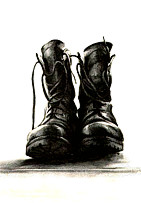
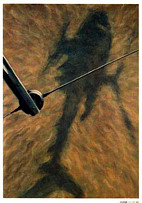
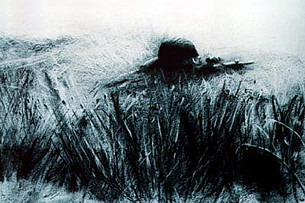
Keith Holmes: Royal Marines and mine-clearing in Cambodia Painter, pasteler and draughtsman, Keith Holmes studied at West Surrey College of Art and Design, and Camberwell School of Arts and Crafts (1973 - 75). In 1999 he was made official artist to the Mines Advisory Group. He was a prize winner in 'The Discerning Eye 1995' , and commended at the 'Guild for Aviation Artists' shows of 1998 and 1999. Keith has worked regularly for the British Royal Marines and the Royal Navy since 1995. One man shows include : 'Sea Soldiers: A year with the Royal Marines' (Royal Society of Pathologists, 1996) 'Flying Soldiers' (Army Flying Museum, 1997) 'Ocean Warriors' (The Mall Galleries, London October 1998) 'I am currently (1999) working with the Mines Advisory Group who generously funded me to go to Laos and Cambodia at the end of last year to see at first hand what they ... were doing to improve conditions. My initial observation is that it will take years to undo the damage, particularly in Cambodia. I'm working towards a big exhibition ... the work will be more than just about landmines or unexploded ordnance (UXO) and will deal with the recent history of the region including effects of the Khmer Rouge in destroying the cultural identity of Cambodia. The underlying theme will be one of fragmentation and this may eventually be the title of the exhibition' top |
|
| War Art and
Artists : A Commision in the Army |
|
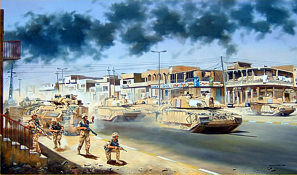 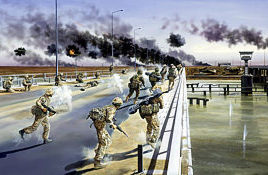 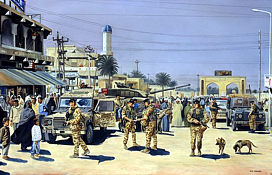 David Rowlands: Painter of Contemporary Regimental Incidents ‘Exactitude is truth’: Representing the British military through commissioned artworks The work of ‘regimental artists’ is often derided for being jingoistic, irrelevant and predicated on anachronistic representational strategies rooted in high-Victorian battle painting. Despite their marginal status, a core of professional painters today work regularly for the British armed services to record, and occasionally commemorate, contemporary and past feats of arms, as well as more mundane public service duties such as ceremonial display and ‘Keeping the Army in the Public Eye’ (KAPE) tours. Their work is largely unseen by the non-military public, largely because it is intended for a closed community of serving soldiers, their families, and veterans who are associated with the unit. Yet, as a sizeable contemporary body of art work, it contributes to the commemorative rhetoric of the British military and employs a number of artists of national standing. Drawing on the author’s own experiences as a several-times commissioned military artist, this paper is a ‘work-in-progress’ that examines the work of several painters - John Ross, Ken Howard, and Keith Holmes - who have worked intermittently for the British armed services in the past three decades. But the paper will takes as its principle working case-study the work of painter David Rowlands, commissioned in the 1990s by the Permanent Joint Headquarters (UK) as their official artist to record the British build-up in the Arabian Gulf, and since then fully employed by units in the British army (and some overseas military units) to paint commemorative works related to active service overseas, largely in Iraq and more recently Afghanistan. Through an examination of Rowlands’ work, the paper touches upon the formal language of military painting, particularly the tensions between illustration and interpretation, between factual and technical accuracy, and examines the issues of authenticity and historical verity. The paper also touches upon issues of agency and reception, and the stresses between the commissioning process, the independence of the artist as interpreter, and broader concerns of testimony and visual authority. Paul Gough 2009 top back to featured artists |
|